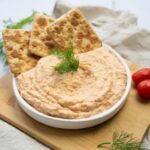How to Stay Regular and Avoid Constipation

Four million people in the United States complain of frequent constipation, making it the number one gastrointestinal complaint resulting in doctor visits. Constipation can be highly uncomfortable and impact your quality of life. Let’s discuss some of the root causes of constipation and how to avoid it [1].
The reason for constipation varies significantly from individual to individual. A poor diet, being sedentary, and dehydration are the primary causes of constipation. According to Rupa Health, there are other causes like anatomical issues, intestinal nervous system disorders, pharmaceuticals (like pain relievers, antidepressants, etc.), metal toxicity, nutrient deficiencies (fiber, potassium, magnesium, etc.), endocrine issues (hypothyroid, diabetes), autoimmune disorders, food allergies, IBS, and behavior disorders. When treating pervasive constipation permanently, it’s essential to figure out the root cause of one’s constipation [2].
By understanding the reasons for constipation, the treatment becomes much more manageable. If you’re suffering from constipation and eating the standard American diet, which includes lots of sugar, processed fats, and artificial ingredients, the first step is to make a diet change. Let’s start with some dietary/lifestyle changes that may help with constipation depending on the individual:
-
-
- Fermented Foods: Our digestive systems contain tiny microbes with many functions, one of which is digestion. Consuming fermented foods, like sauerkraut, kimchi, vinegar, kefir, raw cheese, etc. These foods may help promote the colonization of the “good gut bugs” and alleviate constipation [3].
-
-
-
- Fiber Intake: One of the first nutrition recommendations given to those with constipation is that they should consume more fiber, but is this advice helpful for everyone? There is good evidence that eating more fiber helps treat constipation in many cases [4, 5, 6]. However, consuming fiber may cause gas, bloating, and worsened constipation in some individuals [7,8]. With fiber in mind, consuming more or less is entirely individual and requires some experimentation.
-
-
-
- Stay Hydrated: Make sure you’re consuming enough liquids daily. Maintaining proper levels of electrolytes is crucial for hydration and regular bowel movements; replenish electrolytes if necessary.
-
-
-
- Limit Alcohol: Alcohol impacts the digestive tract in many ways slowing gastric emptying, irritating the stomach lining, reducing the pressure of the esophageal sphincter, causing overgrowth of intestinal bacteria, etc. [9, 10, 11].
-
-
-
- Eat Dietary Fat: Natural sources of dietary fat increase the strength of intestinal construction and help you have a bowel movement. Good sources include animal fat, olive oil, coconut oil, avocado, etc. [12].
- Eat Dietary Fat: Natural sources of dietary fat increase the strength of intestinal construction and help you have a bowel movement. Good sources include animal fat, olive oil, coconut oil, avocado, etc. [12].
-
-
-
- Get Regular Exercise: Walking, running, lifting weights, or whatever exercise you prefer will help prevent and treat constipation. Exercise helps speed up gastric motility, limits the amount of water your body absorbs from the stool and increases breathing and heart rate [13].
-
-
-
- Be Aware of Medications: Medications like narcotic pain meds, iron supplements, antacids, laxative overuse, antidepressants, calcium channel blockers, diuretics, NSAIDs, and several others can cause constipation. Work with your doctor if you’re experiencing constipation and taking these medications.
-
-
-
- Try Supplementation: There are several supplements that you may consider adding. These include magnesium (ideally magnesium citrate), probiotics, carnitine, aloe vera, and senna. Always work with a medical professional to see if you’re appropriate for supplementation [14-17].
-
-
-
- Be Mindful of Dairy: In some cases, lactose intolerance will cause constipation instead of diarrhea. If you’re experiencing GI distress (gas, bloating, diarrhea, constipation, abdominal pain) with dairy, try eliminating it for a period to see if it resolves [18].
-
Most cases of constipation are treated with diet/lifestyle changes without chronic medications. Changing your diet and staying consistent with exercise routines, alongside the other recommendations made here, will help keep you regular and help treat chronic constipation.
Temple Stewart is a Registered Dietitian Nutritionist specializing in low-carb/ketogenic diets. She graduated from the University of Tennessee before starting her career at the Veteran’s Affairs hospital in Bay Pines, Florida. She now operates a telehealth private practice focusing on health and weight loss. You can find her on Instagram @The.Ketogenic.Nutritionist.
References
- https://www.hopkinsmedicine.org/health/conditions-and-diseases/constipation
- https://www.rupahealth.com/post/a-functional-medicine-approach-to-treating-constipation
- Ohkusa, T., Koido, S., Nishikawa, Y., & Sato, N. (2018). Gut Microbiota and Chronic Constipation: A Review and Update. Frontiers in Medicine, 6. https://doi.org/10.3389/fmed.2019.00019
- Portalatin, M., & Winstead, N. (2012). Medical management of constipation. Clinics in colon and rectal surgery, 25(1), 12–19. https://doi.org/10.1055/s-0032-1301754
- Leung, L., Riutta, T., Kotecha, J., & Rosser, W. (2011). Chronic constipation: an evidence-based review. Journal of the American Board of Family Medicine : JABFM, 24(4), 436–451. https://doi.org/10.3122/jabfm.2011.04.100272
- Christodoulides, S., Dimidi, E., Fragkos, K. C., Farmer, A. D., Whelan, K., & Scott, S. M. (2016). Systematic review with meta-analysis: effect of fibre supplementation
- Müller-Lissner, S. A., Kamm, M. A., Scarpignato, C., & Wald, A. (2005). Myths and misconceptions about chronic constipation. The American journal of gastroenterology, 100(1), 232–242. https://doi.org/10.1111/j.1572-0241.2005.40885.xon chronic idiopathic constipation in adults. Alimentary pharmacology & therapeutics, 44(2), 103–116. https://doi.org/10.1111/apt.13662
- Yang, J., Wang, H. P., Zhou, L., & Xu, C. F. (2012). Effect of dietary fiber on constipation: a meta analysis. World journal of gastroenterology, 18(48), 7378–7383. https://doi.org/10.3748/wjg.v18.i48.7378
- https://ncceh.ca/content/alcohol-and-caffeine
- Grad, S., Abenavoli, L., & Dumitrascu, D. L. (2016). The Effect of Alcohol on Gastrointestinal Motility. Reviews on recent clinical trials, 11(3), 191–195. https://doi.org/10.2174/1574887111666160815103251
- Grad, S., Abenavoli, L., & Dumitrascu, D. L. (2016). The Effect of Alcohol on Gastrointestinal Motility. Reviews on recent clinical trials, 11(3), 191–195. https://doi.org/10.2174/1574887111666160815103251
- https://www.healthline.com/health/chronic-constipation/foods-and-recipes#healthy-fats
- https://www.webmd.com/digestive-disorders/exercise-curing-constipation-via-movement#:~:text=Exercise%20helps%20constipation%20by%20lowering,your%20breathing%20and%20heart%20rate.
- Dupont, C., & Hébert, G. (2020). Magnesium Sulfate-Rich Natural Mineral Waters in the Treatment of Functional Constipation–A Review. Nutrients, 12(7). https://doi.org/10.3390/nu12072052
- Eirini Dimidi, Stephanos Christodoulides, Konstantinos C Fragkos, S Mark Scott, Kevin Whelan, The effect of probiotics on functional constipation in adults: a systematic review and meta-analysis of randomized controlled trials, The American Journal of Clinical Nutrition, Volume 100, Issue 4, October 2014, Pages 1075–1084, https://doi.org/10.3945/ajcn.114.089151
- Murata, S., Inoue, K., Aomatsu, T., Yoden, A., & Tamai, H. (2017). Supplementation with carnitine reduces the severity of constipation: a retrospective study of patients with severe motor and intellectual disabilities. Journal of Clinical Biochemistry and Nutrition, 60(2), 121-124. https://doi.org/10.3164/jcbn.16-52
- LiverTox: Clinical and Research Information on Drug-Induced Liver Injury [Internet]. Bethesda (MD): National Institute of Diabetes and Digestive and Kidney Diseases; 2012-. Senna. [Updated 2020 Apr 1]. Available from: https://www.ncbi.nlm.nih.gov/books/NBK547922/
- Leszkowicz, J., Plata-Nazar, K., & Szlagatys-Sidorkiewicz, A. (2022). Can Lactose Intolerance Be a Cause of Constipation? A Narrative Review. Nutrients, 14(9). https://doi.org/10.3390/nu14091785
This article is for informational and educational purposes only. It is not, nor is it intended to be substitute for professional medical advice, diagnosis, or treatment and should never be relied upon for specific medical advice.




















